Counseling Essay: Marie's Case, Grief, Miracle Question Analysis
VerifiedAdded on 2023/01/19
|10
|2888
|87
Essay
AI Summary
This essay delves into a counseling session with a 35-year-old client named Marie, who is grappling with secondary loss following the death of a close friend. The essay examines the counselor's use of the miracle question and the grief loss model to help Marie navigate her grief and depression. It explores the stages of grief according to the Kübler-Ross model (denial, anger, bargaining, depression, and acceptance) and discusses the application of therapeutic techniques such as therapeutic silence, reflection, paraphrasing, and minimal encouragers. The essay analyzes the effectiveness of the miracle question in helping Marie find a path toward acceptance and relief, while also acknowledging the limitations of the intervention, such as its potential lack of long-term impact and dependency on religious faith. The essay concludes by suggesting alternative strategies, such as referrals to mental health professionals and occupational therapists, to provide Marie with more comprehensive and sustainable support. The essay highlights the importance of understanding and addressing the complexities of grief in counseling.
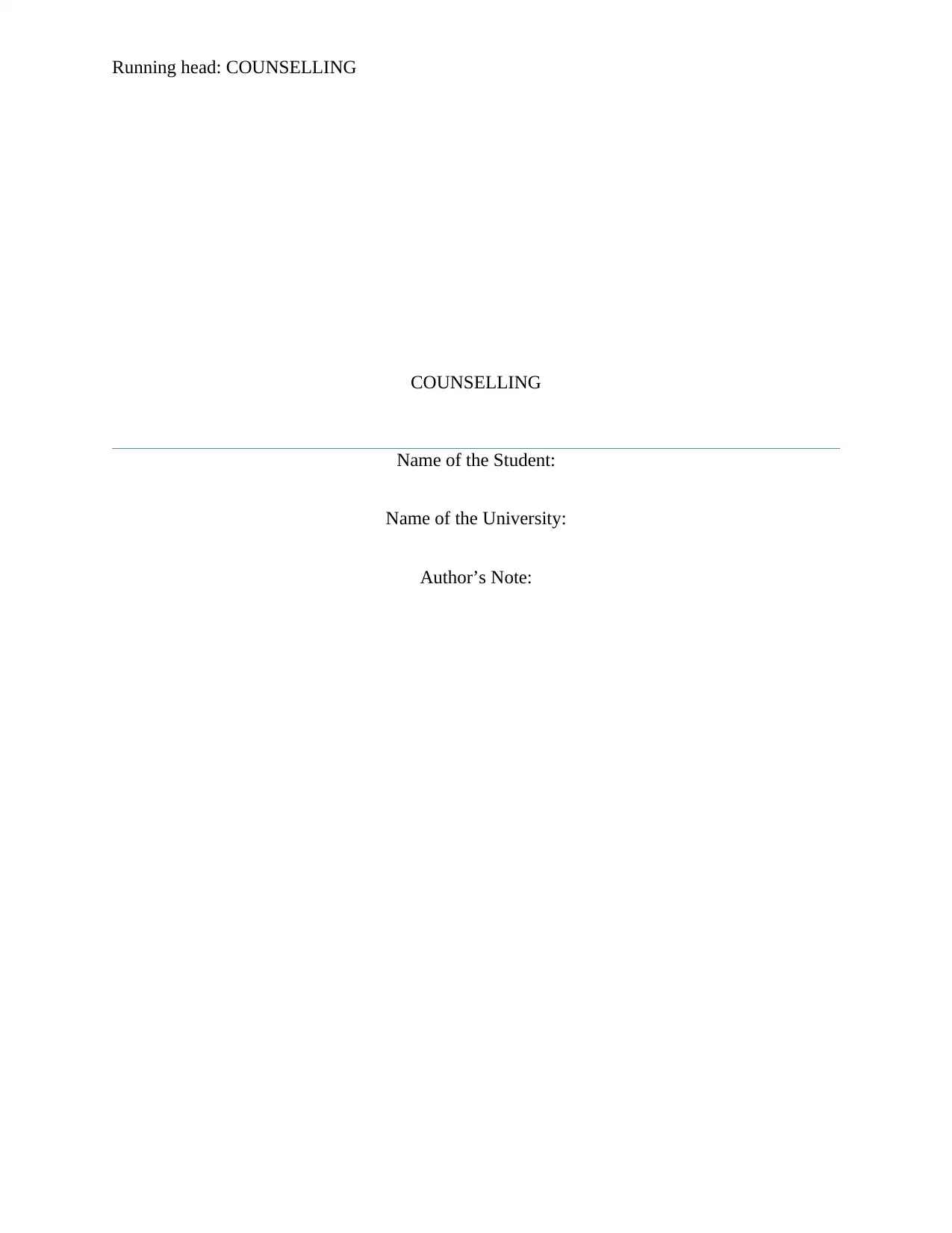
Running head: COUNSELLING
COUNSELLING
Name of the Student:
Name of the University:
Author’s Note:
COUNSELLING
Name of the Student:
Name of the University:
Author’s Note:
Paraphrase This Document
Need a fresh take? Get an instant paraphrase of this document with our AI Paraphraser
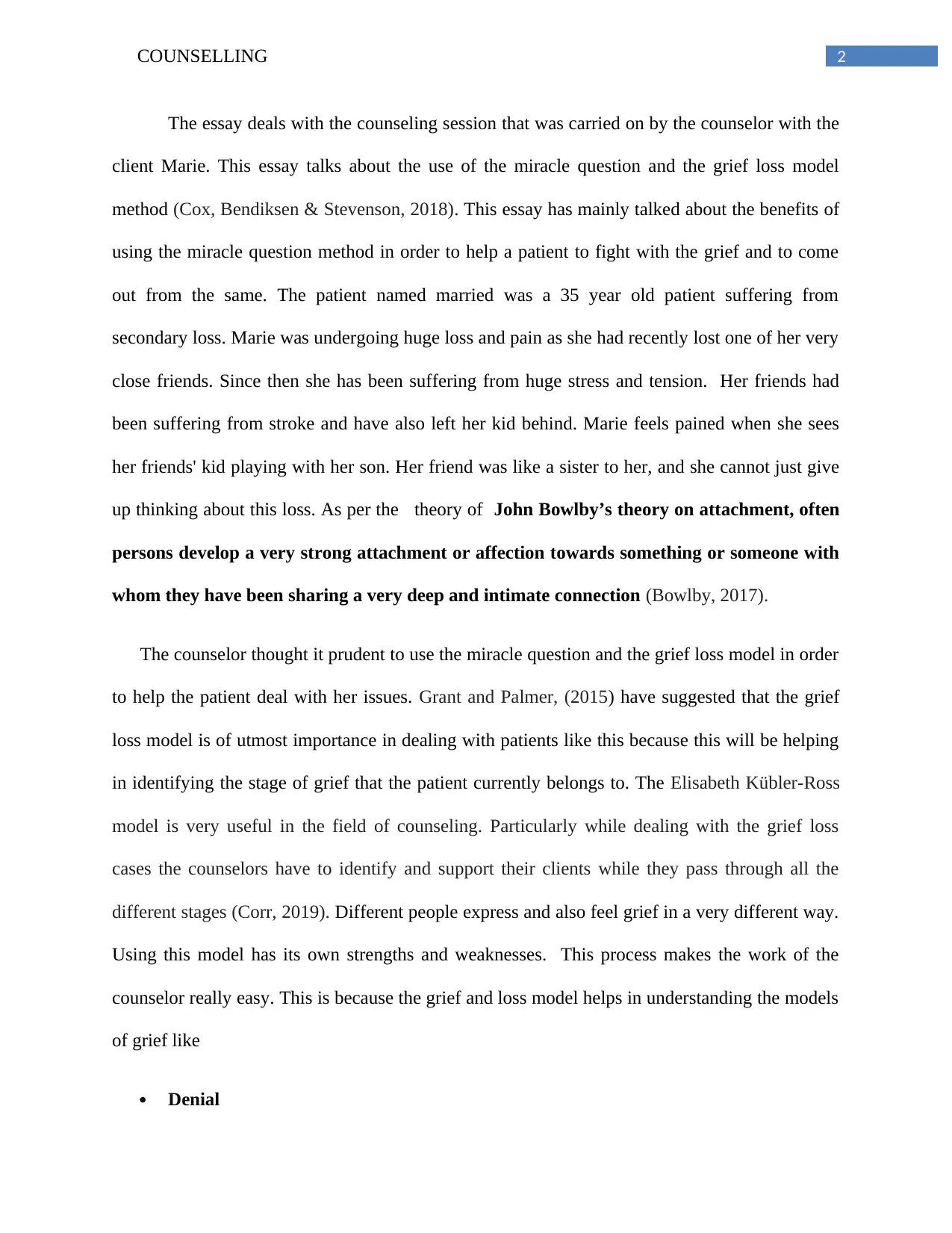
2COUNSELLING
The essay deals with the counseling session that was carried on by the counselor with the
client Marie. This essay talks about the use of the miracle question and the grief loss model
method (Cox, Bendiksen & Stevenson, 2018). This essay has mainly talked about the benefits of
using the miracle question method in order to help a patient to fight with the grief and to come
out from the same. The patient named married was a 35 year old patient suffering from
secondary loss. Marie was undergoing huge loss and pain as she had recently lost one of her very
close friends. Since then she has been suffering from huge stress and tension. Her friends had
been suffering from stroke and have also left her kid behind. Marie feels pained when she sees
her friends' kid playing with her son. Her friend was like a sister to her, and she cannot just give
up thinking about this loss. As per the theory of John Bowlby’s theory on attachment, often
persons develop a very strong attachment or affection towards something or someone with
whom they have been sharing a very deep and intimate connection (Bowlby, 2017).
The counselor thought it prudent to use the miracle question and the grief loss model in order
to help the patient deal with her issues. Grant and Palmer, (2015) have suggested that the grief
loss model is of utmost importance in dealing with patients like this because this will be helping
in identifying the stage of grief that the patient currently belongs to. The Elisabeth Kübler-Ross
model is very useful in the field of counseling. Particularly while dealing with the grief loss
cases the counselors have to identify and support their clients while they pass through all the
different stages (Corr, 2019). Different people express and also feel grief in a very different way.
Using this model has its own strengths and weaknesses. This process makes the work of the
counselor really easy. This is because the grief and loss model helps in understanding the models
of grief like
Denial
The essay deals with the counseling session that was carried on by the counselor with the
client Marie. This essay talks about the use of the miracle question and the grief loss model
method (Cox, Bendiksen & Stevenson, 2018). This essay has mainly talked about the benefits of
using the miracle question method in order to help a patient to fight with the grief and to come
out from the same. The patient named married was a 35 year old patient suffering from
secondary loss. Marie was undergoing huge loss and pain as she had recently lost one of her very
close friends. Since then she has been suffering from huge stress and tension. Her friends had
been suffering from stroke and have also left her kid behind. Marie feels pained when she sees
her friends' kid playing with her son. Her friend was like a sister to her, and she cannot just give
up thinking about this loss. As per the theory of John Bowlby’s theory on attachment, often
persons develop a very strong attachment or affection towards something or someone with
whom they have been sharing a very deep and intimate connection (Bowlby, 2017).
The counselor thought it prudent to use the miracle question and the grief loss model in order
to help the patient deal with her issues. Grant and Palmer, (2015) have suggested that the grief
loss model is of utmost importance in dealing with patients like this because this will be helping
in identifying the stage of grief that the patient currently belongs to. The Elisabeth Kübler-Ross
model is very useful in the field of counseling. Particularly while dealing with the grief loss
cases the counselors have to identify and support their clients while they pass through all the
different stages (Corr, 2019). Different people express and also feel grief in a very different way.
Using this model has its own strengths and weaknesses. This process makes the work of the
counselor really easy. This is because the grief and loss model helps in understanding the models
of grief like
Denial
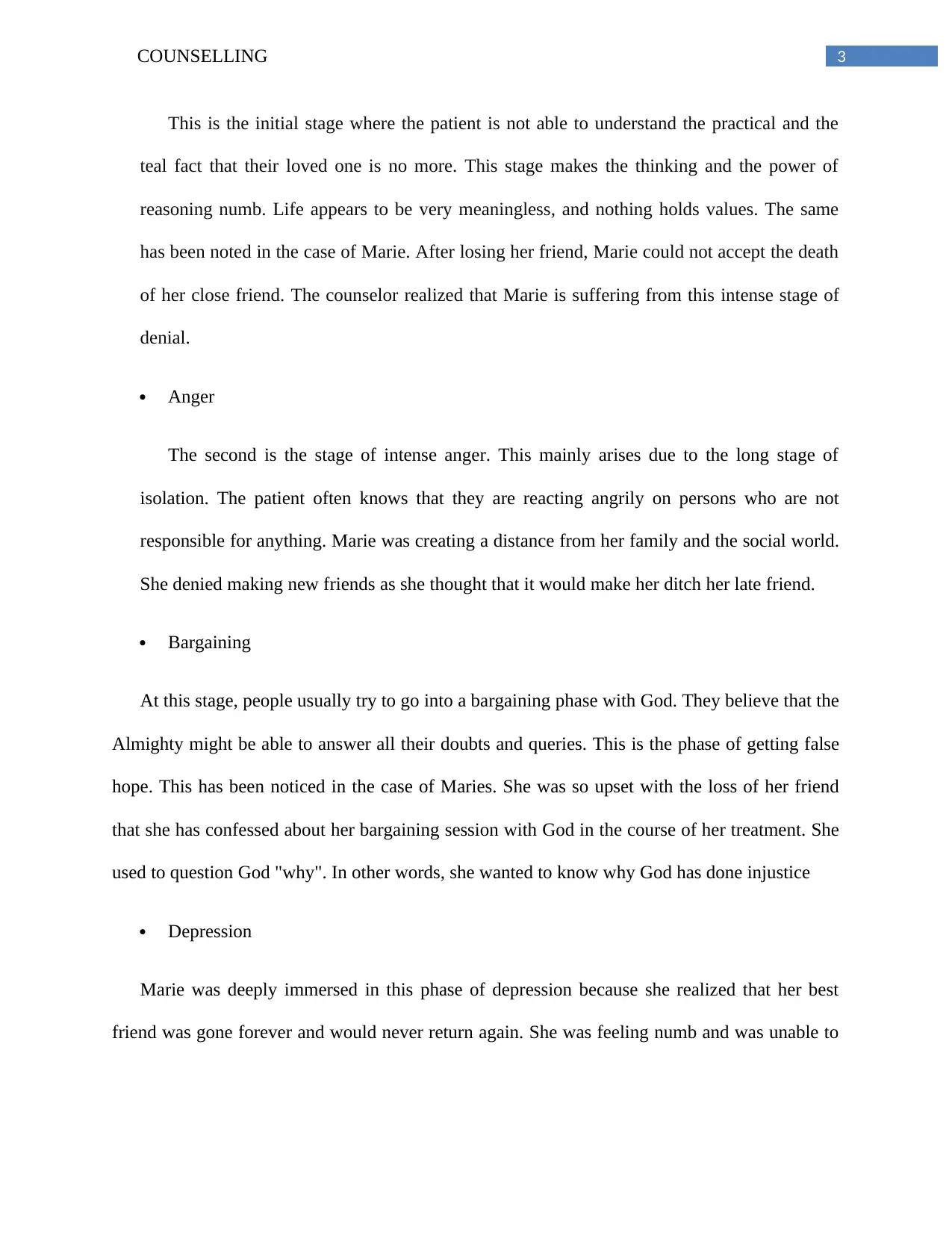
3COUNSELLING
This is the initial stage where the patient is not able to understand the practical and the
teal fact that their loved one is no more. This stage makes the thinking and the power of
reasoning numb. Life appears to be very meaningless, and nothing holds values. The same
has been noted in the case of Marie. After losing her friend, Marie could not accept the death
of her close friend. The counselor realized that Marie is suffering from this intense stage of
denial.
Anger
The second is the stage of intense anger. This mainly arises due to the long stage of
isolation. The patient often knows that they are reacting angrily on persons who are not
responsible for anything. Marie was creating a distance from her family and the social world.
She denied making new friends as she thought that it would make her ditch her late friend.
Bargaining
At this stage, people usually try to go into a bargaining phase with God. They believe that the
Almighty might be able to answer all their doubts and queries. This is the phase of getting false
hope. This has been noticed in the case of Maries. She was so upset with the loss of her friend
that she has confessed about her bargaining session with God in the course of her treatment. She
used to question God "why". In other words, she wanted to know why God has done injustice
Depression
Marie was deeply immersed in this phase of depression because she realized that her best
friend was gone forever and would never return again. She was feeling numb and was unable to
This is the initial stage where the patient is not able to understand the practical and the
teal fact that their loved one is no more. This stage makes the thinking and the power of
reasoning numb. Life appears to be very meaningless, and nothing holds values. The same
has been noted in the case of Marie. After losing her friend, Marie could not accept the death
of her close friend. The counselor realized that Marie is suffering from this intense stage of
denial.
Anger
The second is the stage of intense anger. This mainly arises due to the long stage of
isolation. The patient often knows that they are reacting angrily on persons who are not
responsible for anything. Marie was creating a distance from her family and the social world.
She denied making new friends as she thought that it would make her ditch her late friend.
Bargaining
At this stage, people usually try to go into a bargaining phase with God. They believe that the
Almighty might be able to answer all their doubts and queries. This is the phase of getting false
hope. This has been noticed in the case of Maries. She was so upset with the loss of her friend
that she has confessed about her bargaining session with God in the course of her treatment. She
used to question God "why". In other words, she wanted to know why God has done injustice
Depression
Marie was deeply immersed in this phase of depression because she realized that her best
friend was gone forever and would never return again. She was feeling numb and was unable to
⊘ This is a preview!⊘
Do you want full access?
Subscribe today to unlock all pages.

Trusted by 1+ million students worldwide
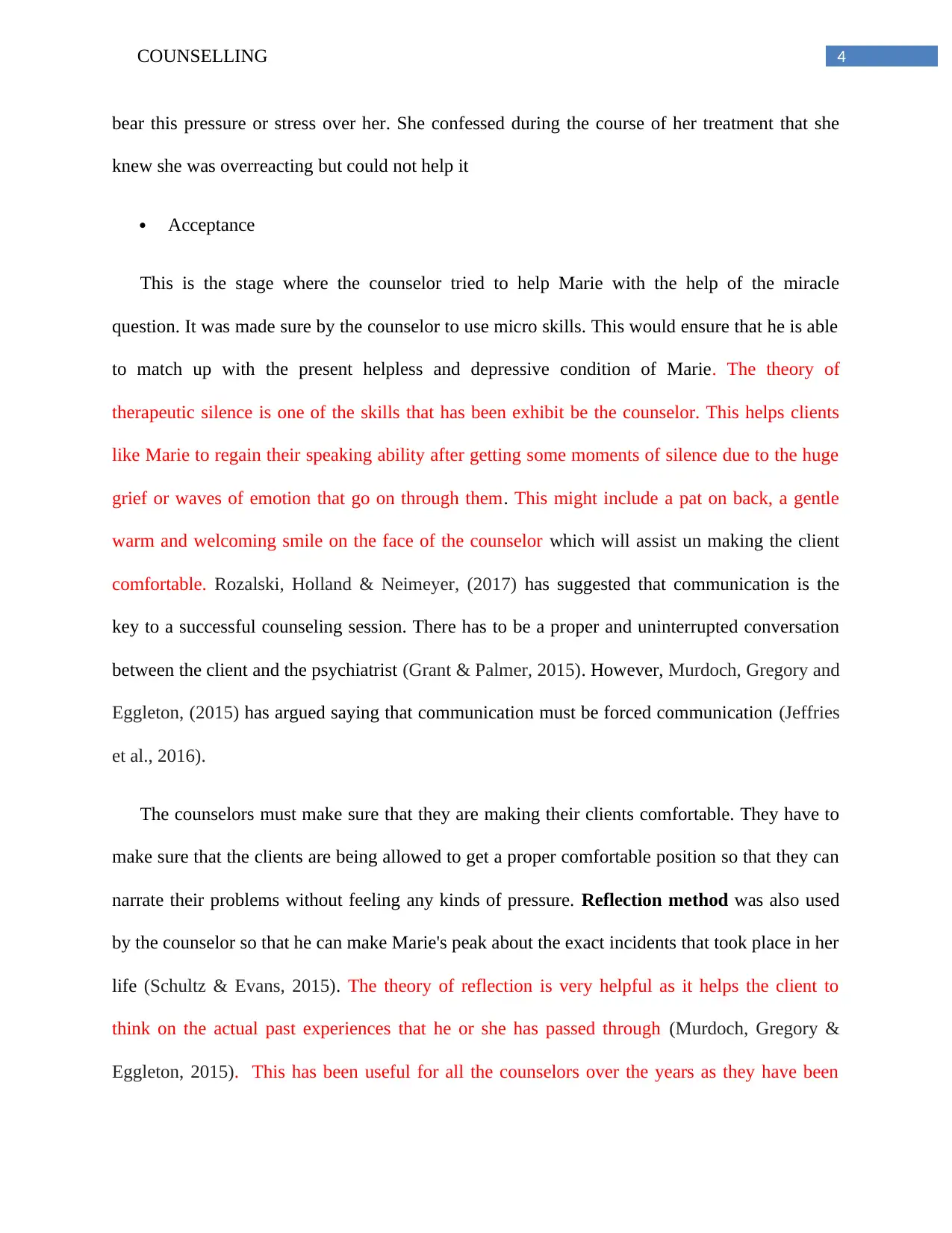
4COUNSELLING
bear this pressure or stress over her. She confessed during the course of her treatment that she
knew she was overreacting but could not help it
Acceptance
This is the stage where the counselor tried to help Marie with the help of the miracle
question. It was made sure by the counselor to use micro skills. This would ensure that he is able
to match up with the present helpless and depressive condition of Marie. The theory of
therapeutic silence is one of the skills that has been exhibit be the counselor. This helps clients
like Marie to regain their speaking ability after getting some moments of silence due to the huge
grief or waves of emotion that go on through them. This might include a pat on back, a gentle
warm and welcoming smile on the face of the counselor which will assist un making the client
comfortable. Rozalski, Holland & Neimeyer, (2017) has suggested that communication is the
key to a successful counseling session. There has to be a proper and uninterrupted conversation
between the client and the psychiatrist (Grant & Palmer, 2015). However, Murdoch, Gregory and
Eggleton, (2015) has argued saying that communication must be forced communication (Jeffries
et al., 2016).
The counselors must make sure that they are making their clients comfortable. They have to
make sure that the clients are being allowed to get a proper comfortable position so that they can
narrate their problems without feeling any kinds of pressure. Reflection method was also used
by the counselor so that he can make Marie's peak about the exact incidents that took place in her
life (Schultz & Evans, 2015). The theory of reflection is very helpful as it helps the client to
think on the actual past experiences that he or she has passed through (Murdoch, Gregory &
Eggleton, 2015). This has been useful for all the counselors over the years as they have been
bear this pressure or stress over her. She confessed during the course of her treatment that she
knew she was overreacting but could not help it
Acceptance
This is the stage where the counselor tried to help Marie with the help of the miracle
question. It was made sure by the counselor to use micro skills. This would ensure that he is able
to match up with the present helpless and depressive condition of Marie. The theory of
therapeutic silence is one of the skills that has been exhibit be the counselor. This helps clients
like Marie to regain their speaking ability after getting some moments of silence due to the huge
grief or waves of emotion that go on through them. This might include a pat on back, a gentle
warm and welcoming smile on the face of the counselor which will assist un making the client
comfortable. Rozalski, Holland & Neimeyer, (2017) has suggested that communication is the
key to a successful counseling session. There has to be a proper and uninterrupted conversation
between the client and the psychiatrist (Grant & Palmer, 2015). However, Murdoch, Gregory and
Eggleton, (2015) has argued saying that communication must be forced communication (Jeffries
et al., 2016).
The counselors must make sure that they are making their clients comfortable. They have to
make sure that the clients are being allowed to get a proper comfortable position so that they can
narrate their problems without feeling any kinds of pressure. Reflection method was also used
by the counselor so that he can make Marie's peak about the exact incidents that took place in her
life (Schultz & Evans, 2015). The theory of reflection is very helpful as it helps the client to
think on the actual past experiences that he or she has passed through (Murdoch, Gregory &
Eggleton, 2015). This has been useful for all the counselors over the years as they have been
Paraphrase This Document
Need a fresh take? Get an instant paraphrase of this document with our AI Paraphraser
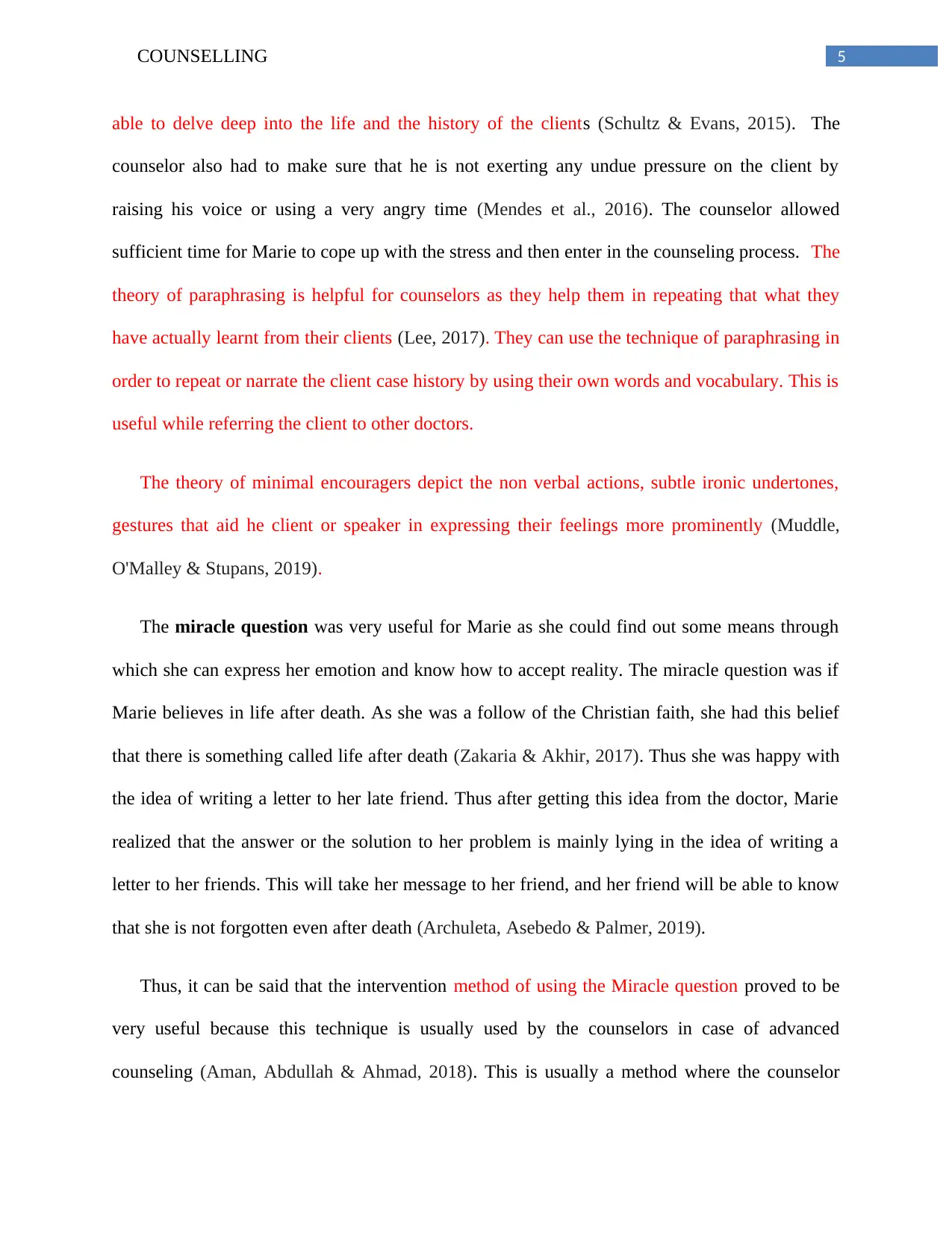
5COUNSELLING
able to delve deep into the life and the history of the clients (Schultz & Evans, 2015). The
counselor also had to make sure that he is not exerting any undue pressure on the client by
raising his voice or using a very angry time (Mendes et al., 2016). The counselor allowed
sufficient time for Marie to cope up with the stress and then enter in the counseling process. The
theory of paraphrasing is helpful for counselors as they help them in repeating that what they
have actually learnt from their clients (Lee, 2017). They can use the technique of paraphrasing in
order to repeat or narrate the client case history by using their own words and vocabulary. This is
useful while referring the client to other doctors.
The theory of minimal encouragers depict the non verbal actions, subtle ironic undertones,
gestures that aid he client or speaker in expressing their feelings more prominently (Muddle,
O'Malley & Stupans, 2019).
The miracle question was very useful for Marie as she could find out some means through
which she can express her emotion and know how to accept reality. The miracle question was if
Marie believes in life after death. As she was a follow of the Christian faith, she had this belief
that there is something called life after death (Zakaria & Akhir, 2017). Thus she was happy with
the idea of writing a letter to her late friend. Thus after getting this idea from the doctor, Marie
realized that the answer or the solution to her problem is mainly lying in the idea of writing a
letter to her friends. This will take her message to her friend, and her friend will be able to know
that she is not forgotten even after death (Archuleta, Asebedo & Palmer, 2019).
Thus, it can be said that the intervention method of using the Miracle question proved to be
very useful because this technique is usually used by the counselors in case of advanced
counseling (Aman, Abdullah & Ahmad, 2018). This is usually a method where the counselor
able to delve deep into the life and the history of the clients (Schultz & Evans, 2015). The
counselor also had to make sure that he is not exerting any undue pressure on the client by
raising his voice or using a very angry time (Mendes et al., 2016). The counselor allowed
sufficient time for Marie to cope up with the stress and then enter in the counseling process. The
theory of paraphrasing is helpful for counselors as they help them in repeating that what they
have actually learnt from their clients (Lee, 2017). They can use the technique of paraphrasing in
order to repeat or narrate the client case history by using their own words and vocabulary. This is
useful while referring the client to other doctors.
The theory of minimal encouragers depict the non verbal actions, subtle ironic undertones,
gestures that aid he client or speaker in expressing their feelings more prominently (Muddle,
O'Malley & Stupans, 2019).
The miracle question was very useful for Marie as she could find out some means through
which she can express her emotion and know how to accept reality. The miracle question was if
Marie believes in life after death. As she was a follow of the Christian faith, she had this belief
that there is something called life after death (Zakaria & Akhir, 2017). Thus she was happy with
the idea of writing a letter to her late friend. Thus after getting this idea from the doctor, Marie
realized that the answer or the solution to her problem is mainly lying in the idea of writing a
letter to her friends. This will take her message to her friend, and her friend will be able to know
that she is not forgotten even after death (Archuleta, Asebedo & Palmer, 2019).
Thus, it can be said that the intervention method of using the Miracle question proved to be
very useful because this technique is usually used by the counselors in case of advanced
counseling (Aman, Abdullah & Ahmad, 2018). This is usually a method where the counselor
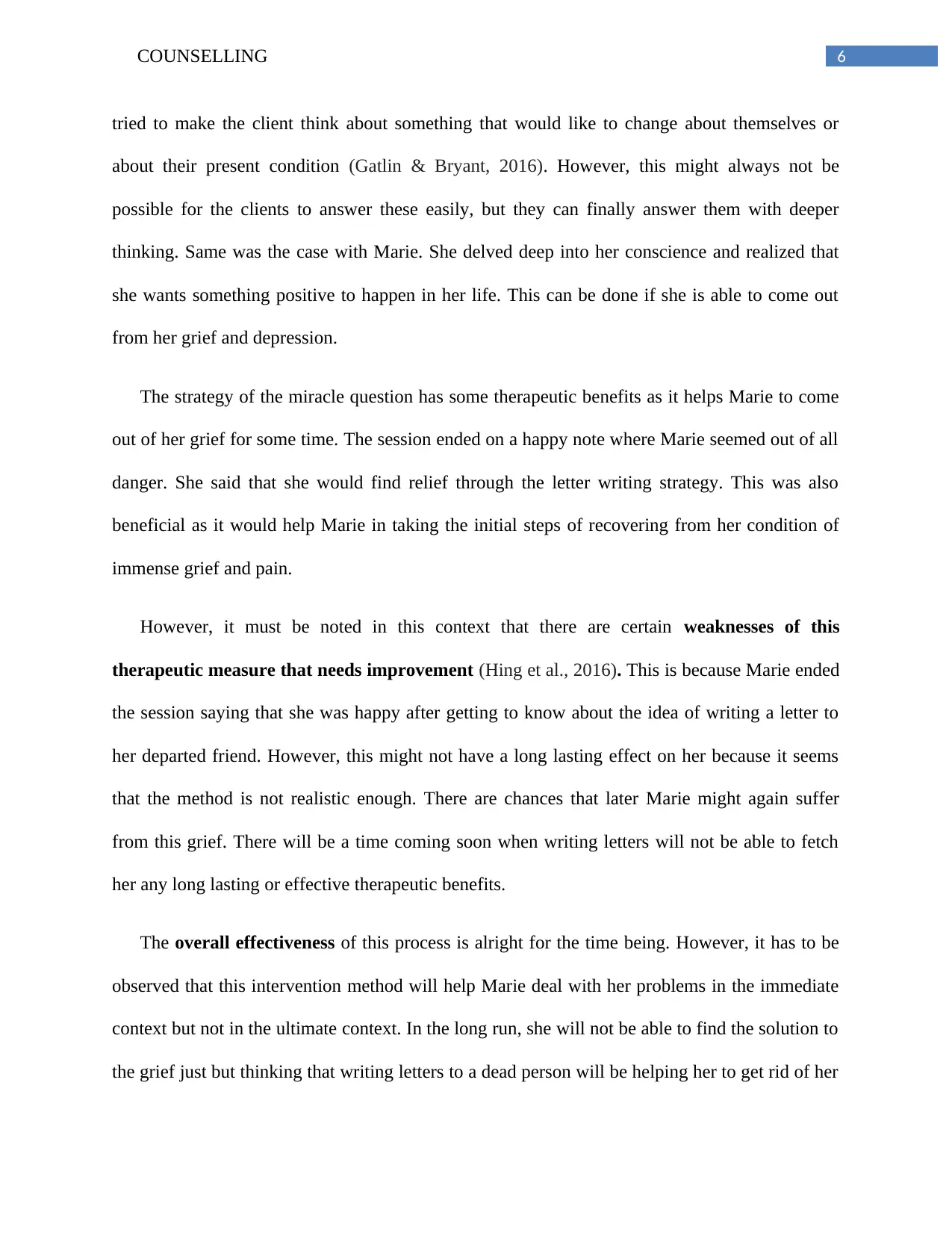
6COUNSELLING
tried to make the client think about something that would like to change about themselves or
about their present condition (Gatlin & Bryant, 2016). However, this might always not be
possible for the clients to answer these easily, but they can finally answer them with deeper
thinking. Same was the case with Marie. She delved deep into her conscience and realized that
she wants something positive to happen in her life. This can be done if she is able to come out
from her grief and depression.
The strategy of the miracle question has some therapeutic benefits as it helps Marie to come
out of her grief for some time. The session ended on a happy note where Marie seemed out of all
danger. She said that she would find relief through the letter writing strategy. This was also
beneficial as it would help Marie in taking the initial steps of recovering from her condition of
immense grief and pain.
However, it must be noted in this context that there are certain weaknesses of this
therapeutic measure that needs improvement (Hing et al., 2016). This is because Marie ended
the session saying that she was happy after getting to know about the idea of writing a letter to
her departed friend. However, this might not have a long lasting effect on her because it seems
that the method is not realistic enough. There are chances that later Marie might again suffer
from this grief. There will be a time coming soon when writing letters will not be able to fetch
her any long lasting or effective therapeutic benefits.
The overall effectiveness of this process is alright for the time being. However, it has to be
observed that this intervention method will help Marie deal with her problems in the immediate
context but not in the ultimate context. In the long run, she will not be able to find the solution to
the grief just but thinking that writing letters to a dead person will be helping her to get rid of her
tried to make the client think about something that would like to change about themselves or
about their present condition (Gatlin & Bryant, 2016). However, this might always not be
possible for the clients to answer these easily, but they can finally answer them with deeper
thinking. Same was the case with Marie. She delved deep into her conscience and realized that
she wants something positive to happen in her life. This can be done if she is able to come out
from her grief and depression.
The strategy of the miracle question has some therapeutic benefits as it helps Marie to come
out of her grief for some time. The session ended on a happy note where Marie seemed out of all
danger. She said that she would find relief through the letter writing strategy. This was also
beneficial as it would help Marie in taking the initial steps of recovering from her condition of
immense grief and pain.
However, it must be noted in this context that there are certain weaknesses of this
therapeutic measure that needs improvement (Hing et al., 2016). This is because Marie ended
the session saying that she was happy after getting to know about the idea of writing a letter to
her departed friend. However, this might not have a long lasting effect on her because it seems
that the method is not realistic enough. There are chances that later Marie might again suffer
from this grief. There will be a time coming soon when writing letters will not be able to fetch
her any long lasting or effective therapeutic benefits.
The overall effectiveness of this process is alright for the time being. However, it has to be
observed that this intervention method will help Marie deal with her problems in the immediate
context but not in the ultimate context. In the long run, she will not be able to find the solution to
the grief just but thinking that writing letters to a dead person will be helping her to get rid of her
⊘ This is a preview!⊘
Do you want full access?
Subscribe today to unlock all pages.

Trusted by 1+ million students worldwide
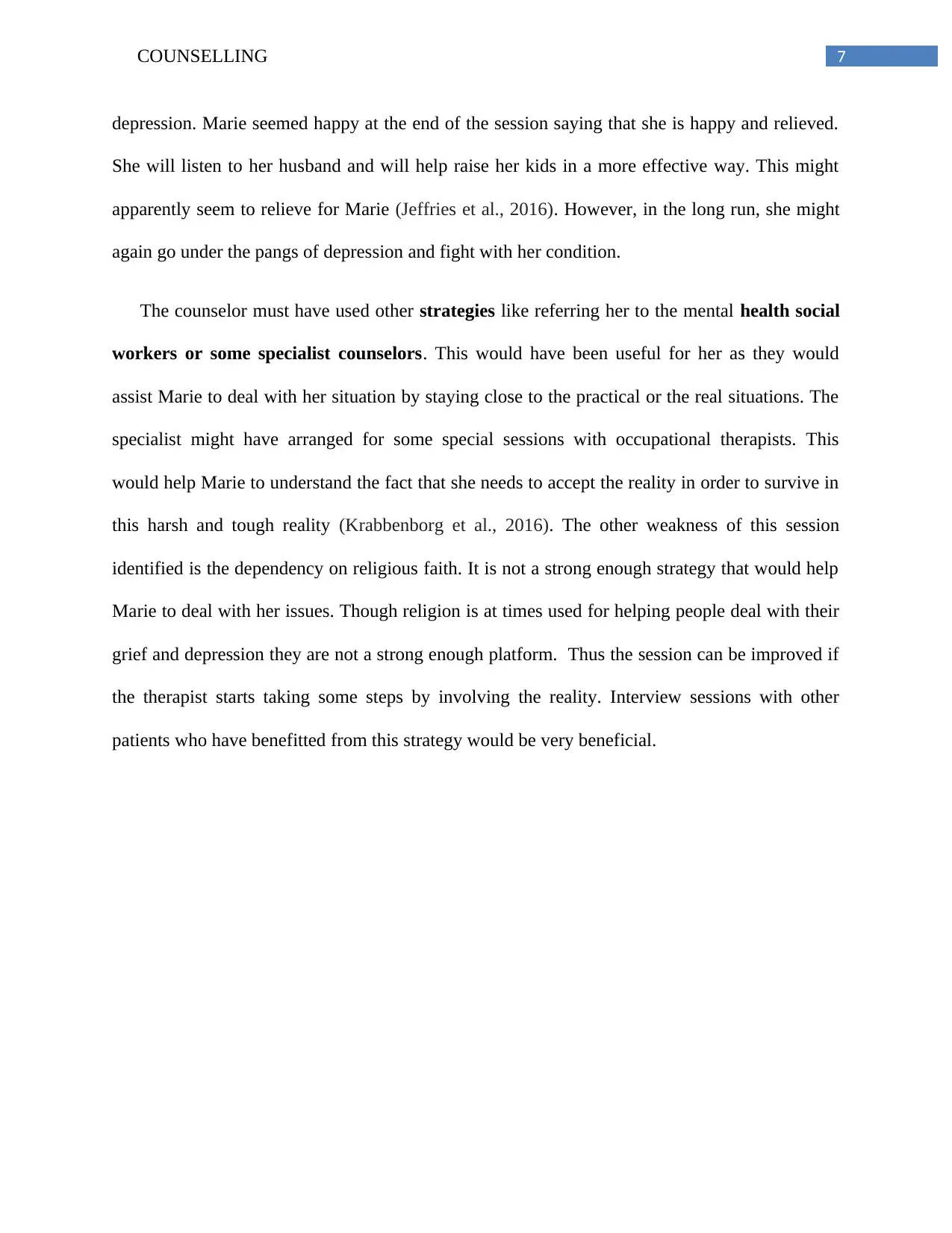
7COUNSELLING
depression. Marie seemed happy at the end of the session saying that she is happy and relieved.
She will listen to her husband and will help raise her kids in a more effective way. This might
apparently seem to relieve for Marie (Jeffries et al., 2016). However, in the long run, she might
again go under the pangs of depression and fight with her condition.
The counselor must have used other strategies like referring her to the mental health social
workers or some specialist counselors. This would have been useful for her as they would
assist Marie to deal with her situation by staying close to the practical or the real situations. The
specialist might have arranged for some special sessions with occupational therapists. This
would help Marie to understand the fact that she needs to accept the reality in order to survive in
this harsh and tough reality (Krabbenborg et al., 2016). The other weakness of this session
identified is the dependency on religious faith. It is not a strong enough strategy that would help
Marie to deal with her issues. Though religion is at times used for helping people deal with their
grief and depression they are not a strong enough platform. Thus the session can be improved if
the therapist starts taking some steps by involving the reality. Interview sessions with other
patients who have benefitted from this strategy would be very beneficial.
depression. Marie seemed happy at the end of the session saying that she is happy and relieved.
She will listen to her husband and will help raise her kids in a more effective way. This might
apparently seem to relieve for Marie (Jeffries et al., 2016). However, in the long run, she might
again go under the pangs of depression and fight with her condition.
The counselor must have used other strategies like referring her to the mental health social
workers or some specialist counselors. This would have been useful for her as they would
assist Marie to deal with her situation by staying close to the practical or the real situations. The
specialist might have arranged for some special sessions with occupational therapists. This
would help Marie to understand the fact that she needs to accept the reality in order to survive in
this harsh and tough reality (Krabbenborg et al., 2016). The other weakness of this session
identified is the dependency on religious faith. It is not a strong enough strategy that would help
Marie to deal with her issues. Though religion is at times used for helping people deal with their
grief and depression they are not a strong enough platform. Thus the session can be improved if
the therapist starts taking some steps by involving the reality. Interview sessions with other
patients who have benefitted from this strategy would be very beneficial.
Paraphrase This Document
Need a fresh take? Get an instant paraphrase of this document with our AI Paraphraser
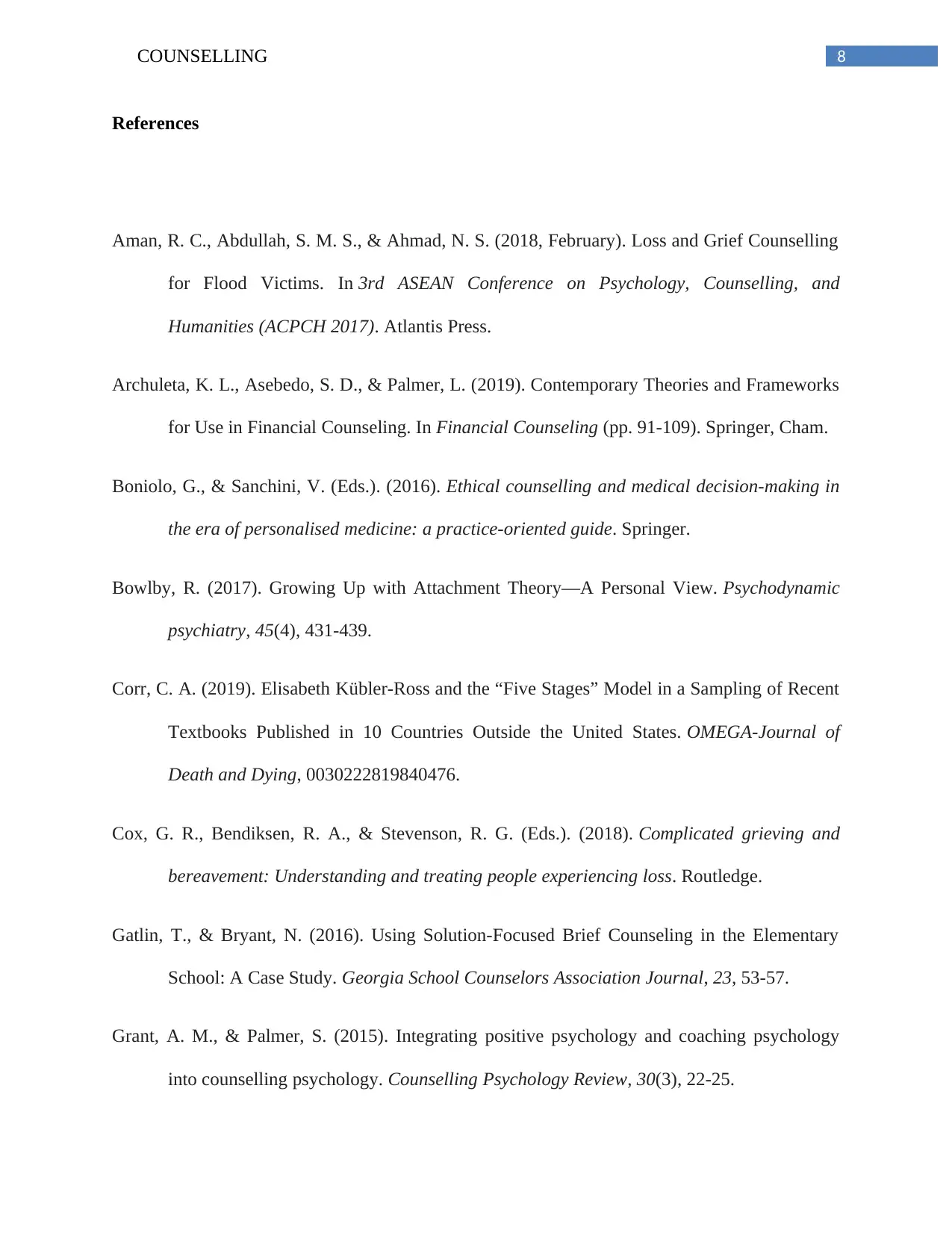
8COUNSELLING
References
Aman, R. C., Abdullah, S. M. S., & Ahmad, N. S. (2018, February). Loss and Grief Counselling
for Flood Victims. In 3rd ASEAN Conference on Psychology, Counselling, and
Humanities (ACPCH 2017). Atlantis Press.
Archuleta, K. L., Asebedo, S. D., & Palmer, L. (2019). Contemporary Theories and Frameworks
for Use in Financial Counseling. In Financial Counseling (pp. 91-109). Springer, Cham.
Boniolo, G., & Sanchini, V. (Eds.). (2016). Ethical counselling and medical decision-making in
the era of personalised medicine: a practice-oriented guide. Springer.
Bowlby, R. (2017). Growing Up with Attachment Theory—A Personal View. Psychodynamic
psychiatry, 45(4), 431-439.
Corr, C. A. (2019). Elisabeth Kübler-Ross and the “Five Stages” Model in a Sampling of Recent
Textbooks Published in 10 Countries Outside the United States. OMEGA-Journal of
Death and Dying, 0030222819840476.
Cox, G. R., Bendiksen, R. A., & Stevenson, R. G. (Eds.). (2018). Complicated grieving and
bereavement: Understanding and treating people experiencing loss. Routledge.
Gatlin, T., & Bryant, N. (2016). Using Solution-Focused Brief Counseling in the Elementary
School: A Case Study. Georgia School Counselors Association Journal, 23, 53-57.
Grant, A. M., & Palmer, S. (2015). Integrating positive psychology and coaching psychology
into counselling psychology. Counselling Psychology Review, 30(3), 22-25.
References
Aman, R. C., Abdullah, S. M. S., & Ahmad, N. S. (2018, February). Loss and Grief Counselling
for Flood Victims. In 3rd ASEAN Conference on Psychology, Counselling, and
Humanities (ACPCH 2017). Atlantis Press.
Archuleta, K. L., Asebedo, S. D., & Palmer, L. (2019). Contemporary Theories and Frameworks
for Use in Financial Counseling. In Financial Counseling (pp. 91-109). Springer, Cham.
Boniolo, G., & Sanchini, V. (Eds.). (2016). Ethical counselling and medical decision-making in
the era of personalised medicine: a practice-oriented guide. Springer.
Bowlby, R. (2017). Growing Up with Attachment Theory—A Personal View. Psychodynamic
psychiatry, 45(4), 431-439.
Corr, C. A. (2019). Elisabeth Kübler-Ross and the “Five Stages” Model in a Sampling of Recent
Textbooks Published in 10 Countries Outside the United States. OMEGA-Journal of
Death and Dying, 0030222819840476.
Cox, G. R., Bendiksen, R. A., & Stevenson, R. G. (Eds.). (2018). Complicated grieving and
bereavement: Understanding and treating people experiencing loss. Routledge.
Gatlin, T., & Bryant, N. (2016). Using Solution-Focused Brief Counseling in the Elementary
School: A Case Study. Georgia School Counselors Association Journal, 23, 53-57.
Grant, A. M., & Palmer, S. (2015). Integrating positive psychology and coaching psychology
into counselling psychology. Counselling Psychology Review, 30(3), 22-25.
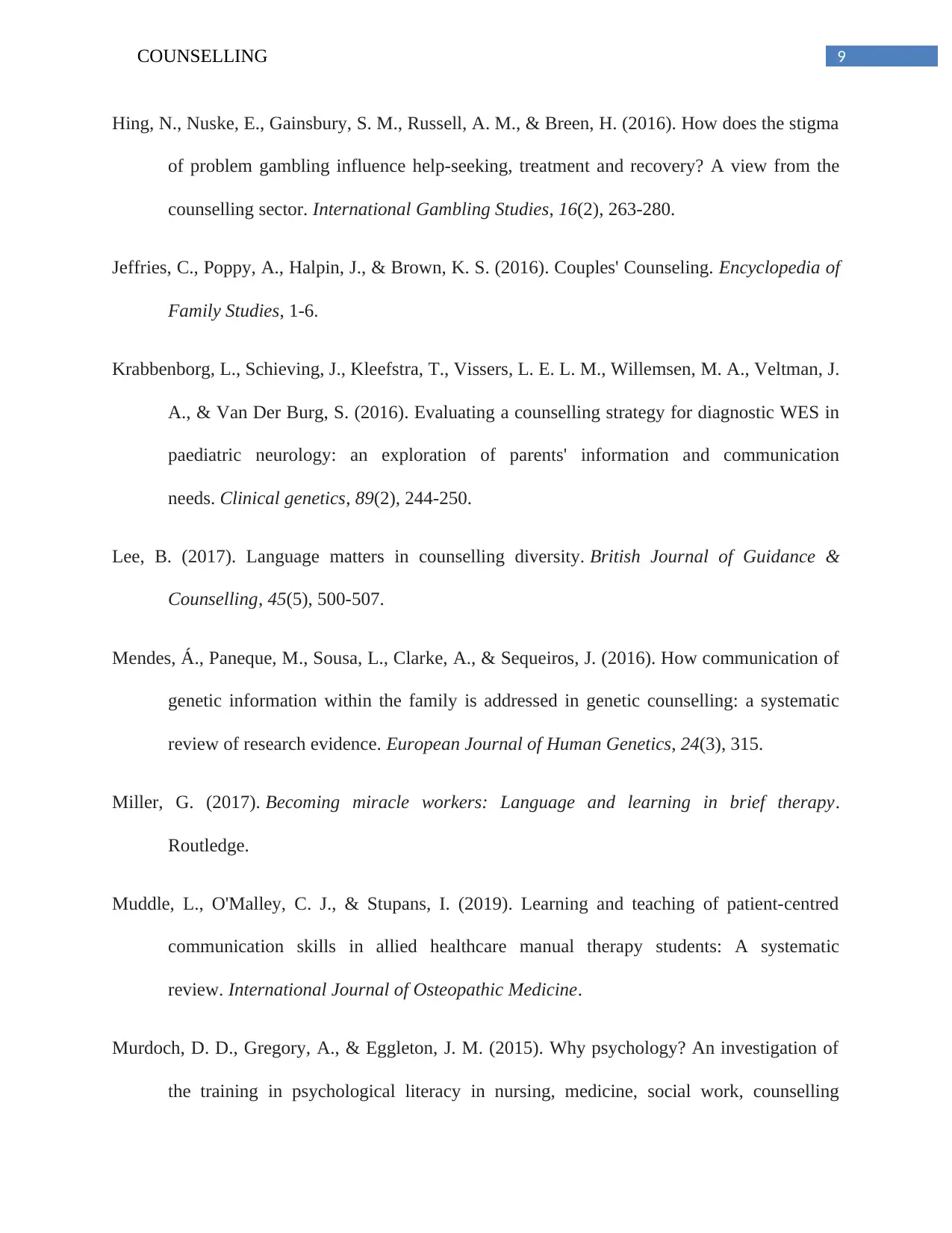
9COUNSELLING
Hing, N., Nuske, E., Gainsbury, S. M., Russell, A. M., & Breen, H. (2016). How does the stigma
of problem gambling influence help-seeking, treatment and recovery? A view from the
counselling sector. International Gambling Studies, 16(2), 263-280.
Jeffries, C., Poppy, A., Halpin, J., & Brown, K. S. (2016). Couples' Counseling. Encyclopedia of
Family Studies, 1-6.
Krabbenborg, L., Schieving, J., Kleefstra, T., Vissers, L. E. L. M., Willemsen, M. A., Veltman, J.
A., & Van Der Burg, S. (2016). Evaluating a counselling strategy for diagnostic WES in
paediatric neurology: an exploration of parents' information and communication
needs. Clinical genetics, 89(2), 244-250.
Lee, B. (2017). Language matters in counselling diversity. British Journal of Guidance &
Counselling, 45(5), 500-507.
Mendes, Á., Paneque, M., Sousa, L., Clarke, A., & Sequeiros, J. (2016). How communication of
genetic information within the family is addressed in genetic counselling: a systematic
review of research evidence. European Journal of Human Genetics, 24(3), 315.
Miller, G. (2017). Becoming miracle workers: Language and learning in brief therapy.
Routledge.
Muddle, L., O'Malley, C. J., & Stupans, I. (2019). Learning and teaching of patient-centred
communication skills in allied healthcare manual therapy students: A systematic
review. International Journal of Osteopathic Medicine.
Murdoch, D. D., Gregory, A., & Eggleton, J. M. (2015). Why psychology? An investigation of
the training in psychological literacy in nursing, medicine, social work, counselling
Hing, N., Nuske, E., Gainsbury, S. M., Russell, A. M., & Breen, H. (2016). How does the stigma
of problem gambling influence help-seeking, treatment and recovery? A view from the
counselling sector. International Gambling Studies, 16(2), 263-280.
Jeffries, C., Poppy, A., Halpin, J., & Brown, K. S. (2016). Couples' Counseling. Encyclopedia of
Family Studies, 1-6.
Krabbenborg, L., Schieving, J., Kleefstra, T., Vissers, L. E. L. M., Willemsen, M. A., Veltman, J.
A., & Van Der Burg, S. (2016). Evaluating a counselling strategy for diagnostic WES in
paediatric neurology: an exploration of parents' information and communication
needs. Clinical genetics, 89(2), 244-250.
Lee, B. (2017). Language matters in counselling diversity. British Journal of Guidance &
Counselling, 45(5), 500-507.
Mendes, Á., Paneque, M., Sousa, L., Clarke, A., & Sequeiros, J. (2016). How communication of
genetic information within the family is addressed in genetic counselling: a systematic
review of research evidence. European Journal of Human Genetics, 24(3), 315.
Miller, G. (2017). Becoming miracle workers: Language and learning in brief therapy.
Routledge.
Muddle, L., O'Malley, C. J., & Stupans, I. (2019). Learning and teaching of patient-centred
communication skills in allied healthcare manual therapy students: A systematic
review. International Journal of Osteopathic Medicine.
Murdoch, D. D., Gregory, A., & Eggleton, J. M. (2015). Why psychology? An investigation of
the training in psychological literacy in nursing, medicine, social work, counselling
⊘ This is a preview!⊘
Do you want full access?
Subscribe today to unlock all pages.

Trusted by 1+ million students worldwide
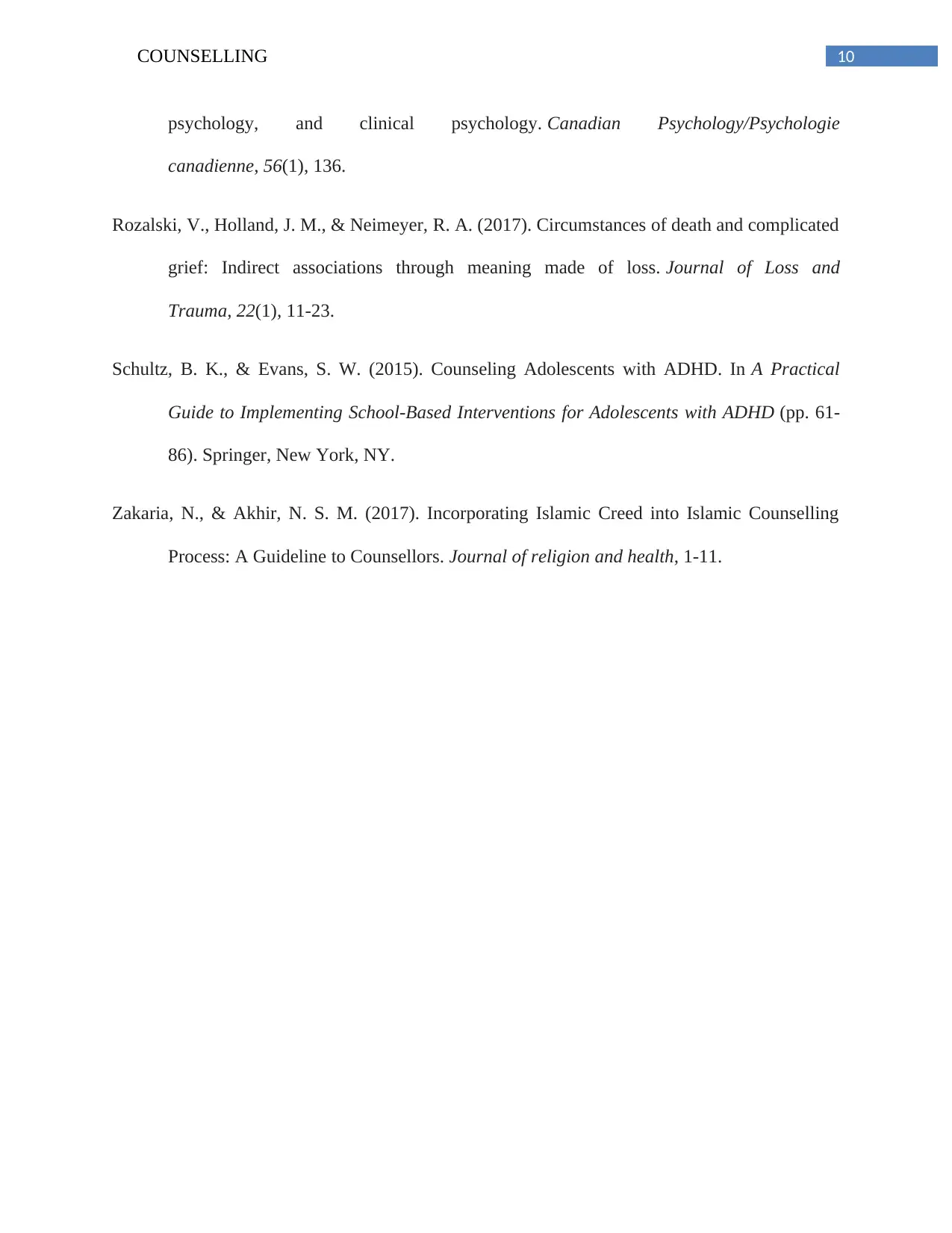
10COUNSELLING
psychology, and clinical psychology. Canadian Psychology/Psychologie
canadienne, 56(1), 136.
Rozalski, V., Holland, J. M., & Neimeyer, R. A. (2017). Circumstances of death and complicated
grief: Indirect associations through meaning made of loss. Journal of Loss and
Trauma, 22(1), 11-23.
Schultz, B. K., & Evans, S. W. (2015). Counseling Adolescents with ADHD. In A Practical
Guide to Implementing School-Based Interventions for Adolescents with ADHD (pp. 61-
86). Springer, New York, NY.
Zakaria, N., & Akhir, N. S. M. (2017). Incorporating Islamic Creed into Islamic Counselling
Process: A Guideline to Counsellors. Journal of religion and health, 1-11.
psychology, and clinical psychology. Canadian Psychology/Psychologie
canadienne, 56(1), 136.
Rozalski, V., Holland, J. M., & Neimeyer, R. A. (2017). Circumstances of death and complicated
grief: Indirect associations through meaning made of loss. Journal of Loss and
Trauma, 22(1), 11-23.
Schultz, B. K., & Evans, S. W. (2015). Counseling Adolescents with ADHD. In A Practical
Guide to Implementing School-Based Interventions for Adolescents with ADHD (pp. 61-
86). Springer, New York, NY.
Zakaria, N., & Akhir, N. S. M. (2017). Incorporating Islamic Creed into Islamic Counselling
Process: A Guideline to Counsellors. Journal of religion and health, 1-11.
1 out of 10
Related Documents
Your All-in-One AI-Powered Toolkit for Academic Success.
+13062052269
info@desklib.com
Available 24*7 on WhatsApp / Email
![[object Object]](/_next/static/media/star-bottom.7253800d.svg)
Unlock your academic potential
Copyright © 2020–2026 A2Z Services. All Rights Reserved. Developed and managed by ZUCOL.





